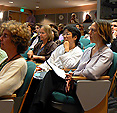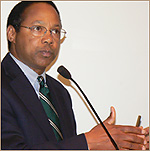Campus Develops Strategic Plan to Guide its Future

Many faculty and staff gathered June 28 at a town hall meeting on the UCSF strategic planning initiative.
- • Unprecedented growth in the last 15 years;
- • Expansion to Mount Zion, Laurel Heights and Mission Bay
- • Steadily declining state support; and
- • Dramatic advances in science, medicine and technology.
 |
Executive Vice Chancellor updates the campus community on the strategic planning process. |
UCSF is in the first phase of what will be an inclusive, four-phase strategic planning process, ending in February 2007 with a comprehensive plan, Washington explained. "At the end of the day," Washington said, "not all suggested priorities can be supported initially. However, everyone should feel they had a chance to be heard and that their priorities were considered." The first phase includes completion of interviews conducted with 188 members of the campus community and conducting an online UCSF-wide survey, as well as carrying out an environmental assessment incorporating extensive data collection and analysis on trends in student recruitment, faculty retention, clinical care, research funding and other critical issues. The first phase also includes benchmarking. "We will examine UCSF data and compare it with what's happening around the country," Washington said. At the town hall meeting, Washington shared the summary of interviews of the faculty, staff, students and campus officials, who voiced what they believe are UCSF's greatest overall strengths and greatest overall weaknesses, which are also posted online in a Strategic Planning Interview Summary. (PDF) Later this month, the Strategic Planning Board will attend a retreat to discuss the results of a comprehensive UCSF environmental assessment and the online survey and draft a preliminary outline of strategic directions. This activity will lead into the second phase to define a global direction and identify the mission, vision, values and goals. The need for a clearly defined UCSF future vision was a priority identified in the campus interview process. During the third phase of strategic development, teams will convene monthly from September through December to develop a course of action for specific parts of the preliminary strategic plan. During this period, UCSF will conduct a second round of town hall meetings to obtain additional feedback from the community. Strategic Priorities
Asked to identify the top three strategic priorities for UCSF in the short and long term, the interviewees responded like this:
- 1. Address space facilities, information technology and other infrastructure issues.
- 2. Focus on recruitment and retention of high-quality faculty, staff and students.
- 3. Clearly articulate a strategic vision and plan for the future that incorporates input from all at UCSF.
- 4. Ensure strong institutional leadership.
- 5. Address the challenges created by the existence of multiple campuses.
- 6. Secure sustainable and diversified funding.
- 7. Enhance clinical care quality, access and patient satisfaction.
- 8. Strengthen collaboration across schools, disciplines and professions.
- 9. Focus on UCSF's educational mission.
- 10. Achieve greater balance among all mission areas.